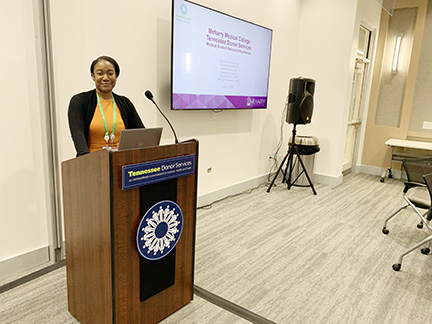By Logan Langlois
NASHVILLE, TN — History is made in the Tennessee Donor Services building as two revered medical institutions join forces to establish a program that is the first of its kind in our nation. The event celebrates the establishment of the TDS-Meharry program, with which Meharry Medical College and Tennessee Donor Services (TDS) seek to address disparities in organ donation and work to further diversify the donation workforce. The TDS-Meharry program plans to do this by providing young medical students with foundational experiences early in their medical training in an effort to help attract new talent to the industry.
The effort to create a far more diverse workforce in the organ donation industry stems from the shocking statistic that only 5.5 percent of surgeons within the United States practicing in this field are Black. This statistic is made all the more disturbing when considering the significant disparity between the race of doctors and patients, with Black Americans being the most out of any demographic in the country actively on the transplant waiting list, sitting at over 30,000 people. At the event, six students from the TDS-Meharry program sat down with Dr. James Hildreth to discuss both groundbreaking transplant recovery as well as hands-on experiences they’ve had in the field while participating.
TDS’s Executive Director Jill Grandas says that she hopes the program will be another way to re-establish much of the trust lost between Nashville’s Black community and the medical community.
“I think it breaks down a barrier that we have observed as perhaps mistrust in the Black community of whatever this process might look like,” she said just before the six students involved gave presentations regarding their work.
“There’s a stigma about organ donation that for example, if someone thinks ‘I’m an organ donor they’re not going to save me,’ those kinds of misconceptions. Having these students experience what we do when the hospital calls Tennessee Donor Services and [how] we respond to the hospital to make an assessment about whether or not the patient is a candidate for donation and talk to a family about their option to donate, their opportunity to donate. These students are observing that firsthand, so they know the compassion and sensitivity that we approach that with.”
One of the students Teresa Belledent, who was then finishing out her seventh week of the eight-weeklong summer program, said that it’s worked to both pique her interest and show her much as to what she could expect from choosing to perform these kinds of surgery. Belledent also went on to explain how much of the selling point which convinced her to apply for the TDS-Meharry program was the way Dr. Marty Sellers, an organ recovery surgeon for TDS, said he would be teaching the students following the program.
“Dr. Sellers was very good at explaining how he wants to be a mentor, how he wants us to actually get to shadow him in the OR [operating room], and actually explained how he would be very hands-on in the program,” she said sitting at a table facing where she would later be presenting what she had learned in front of an audience in about an hour.
“A lot of places you just get dropped into a lab and nobody talks to you. He made it clear that he would be with us and taking care of the process so that made me want to come here.”



